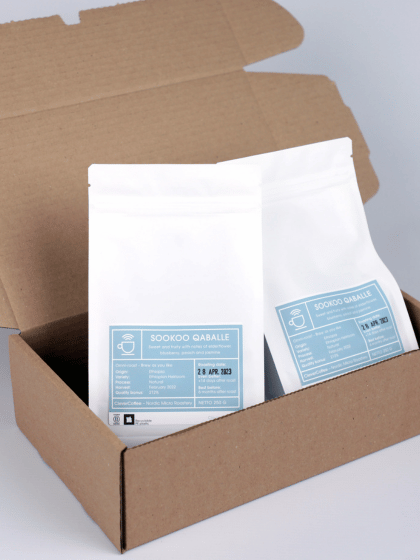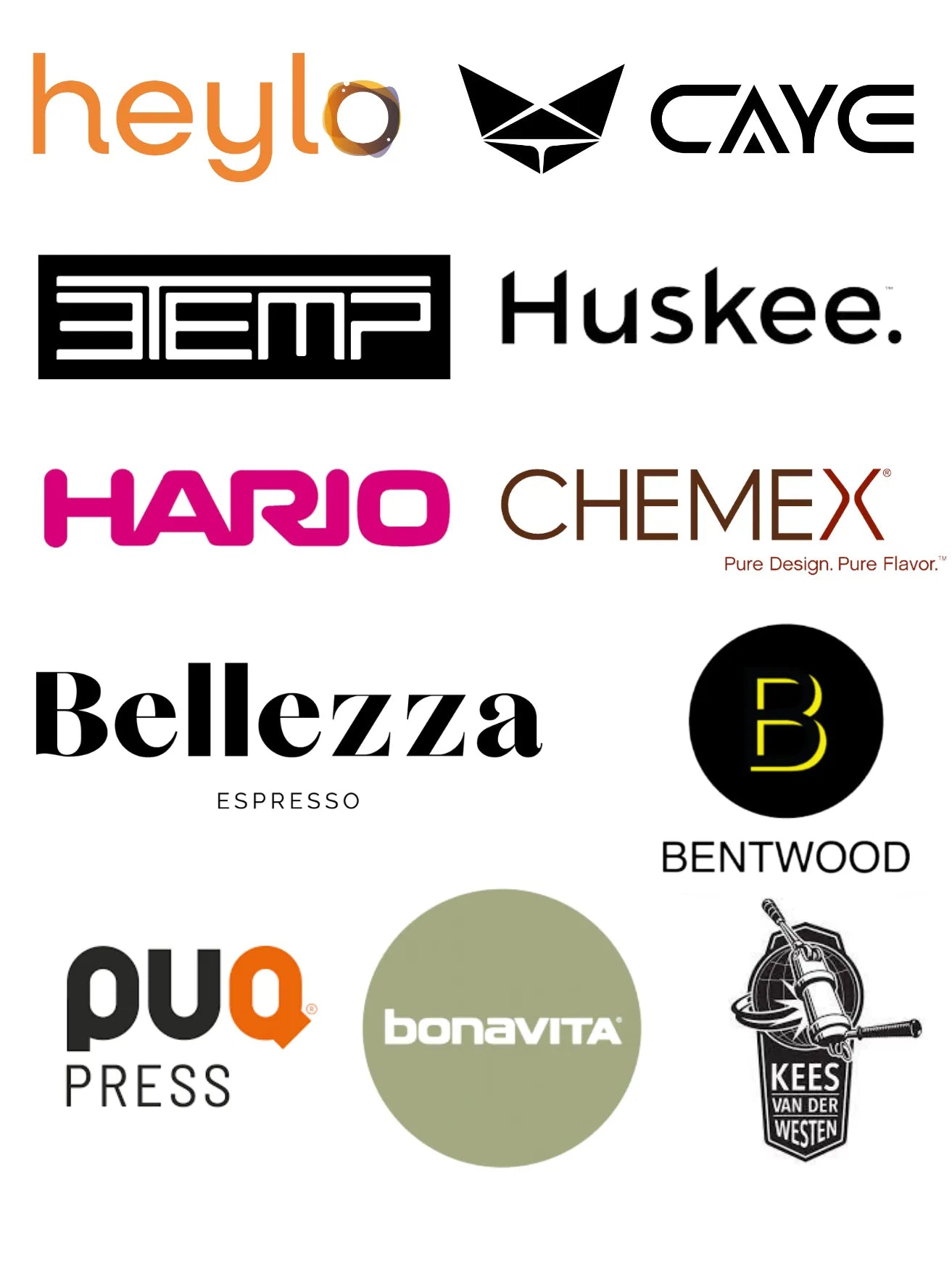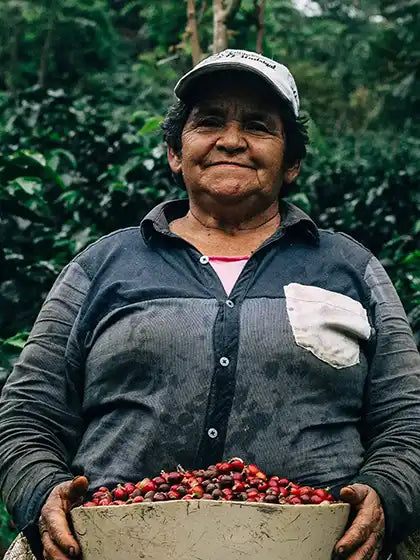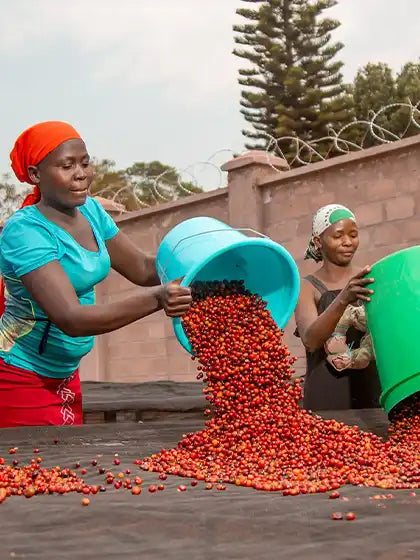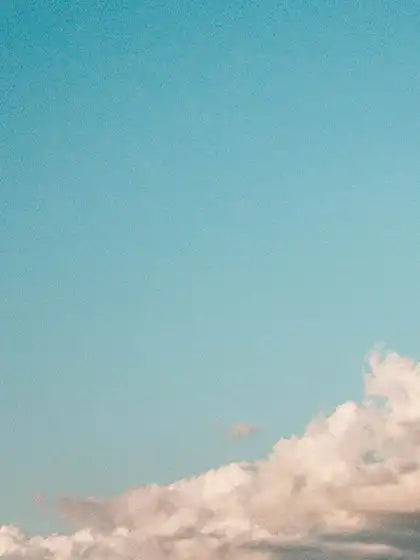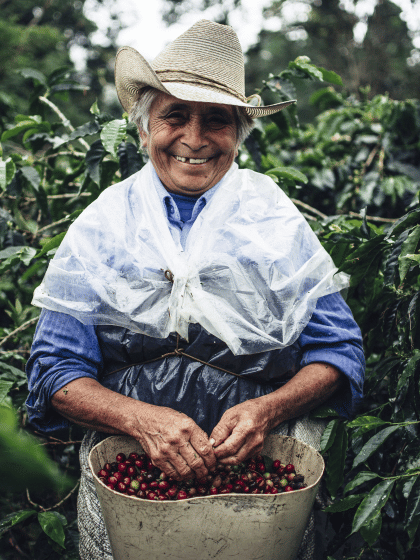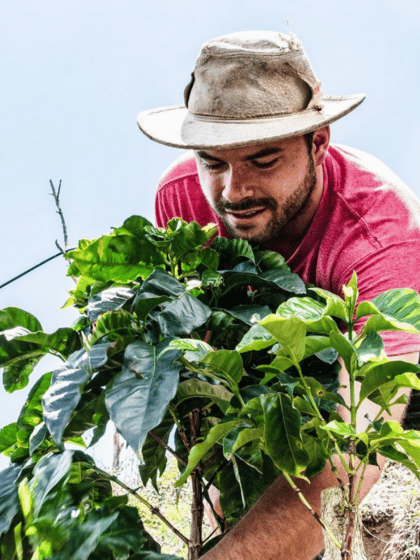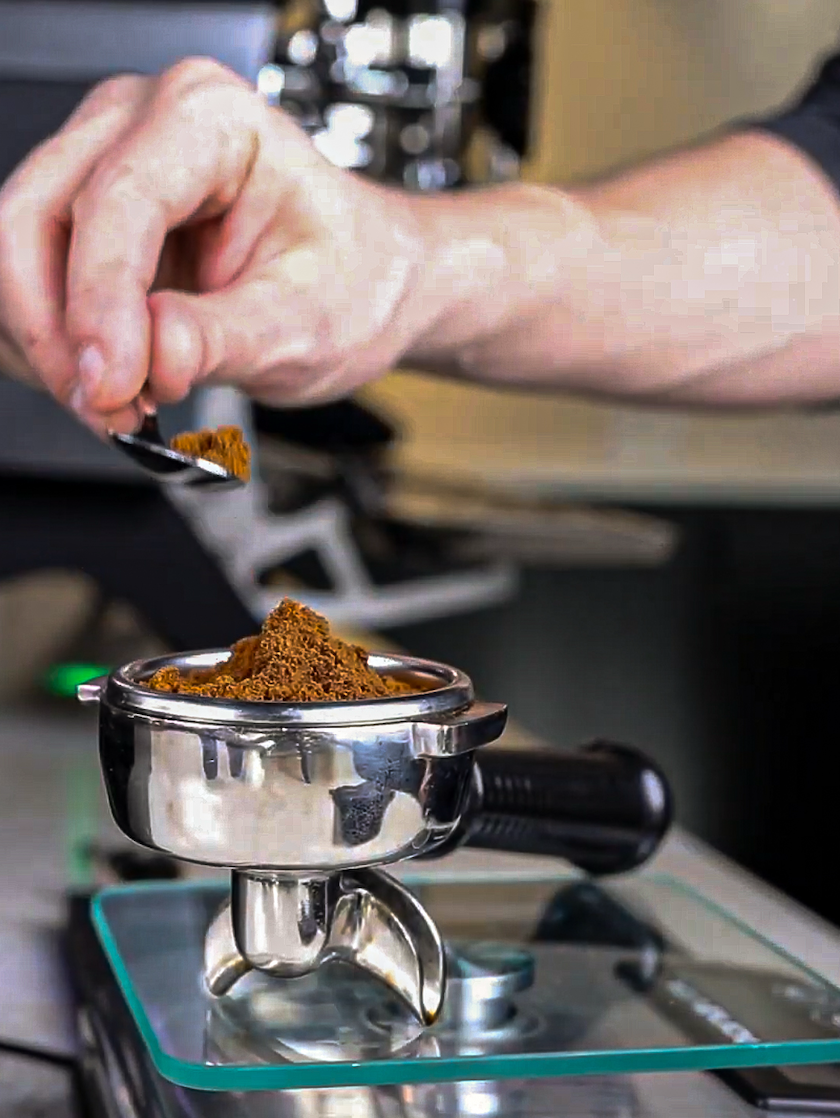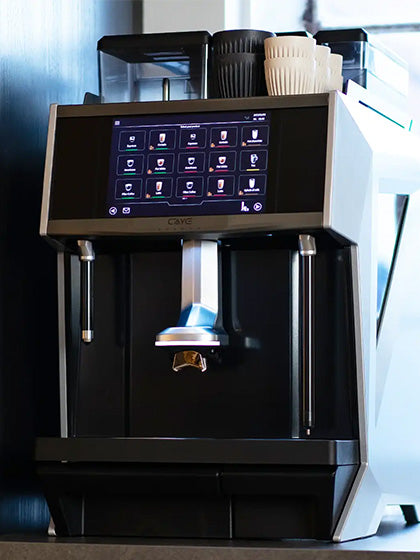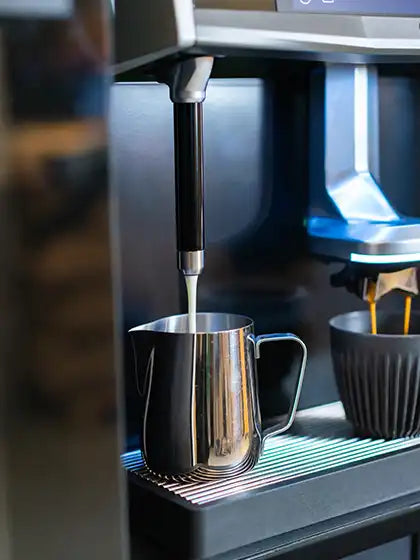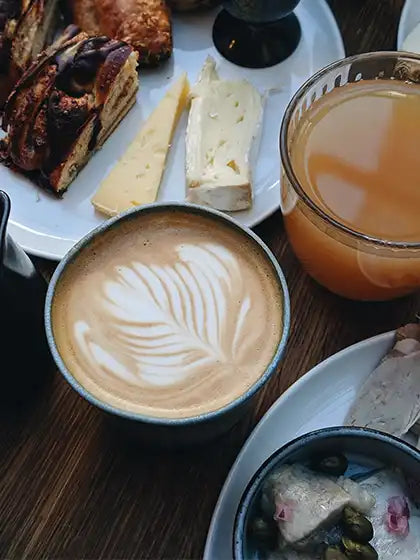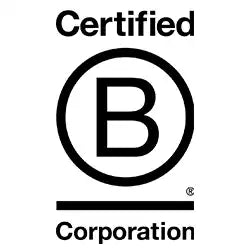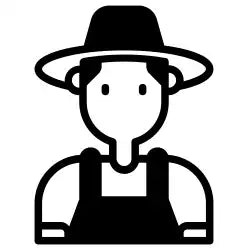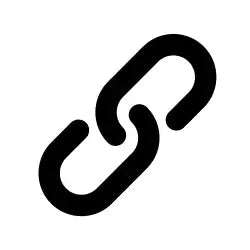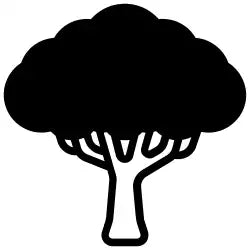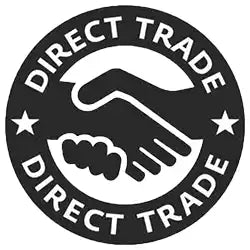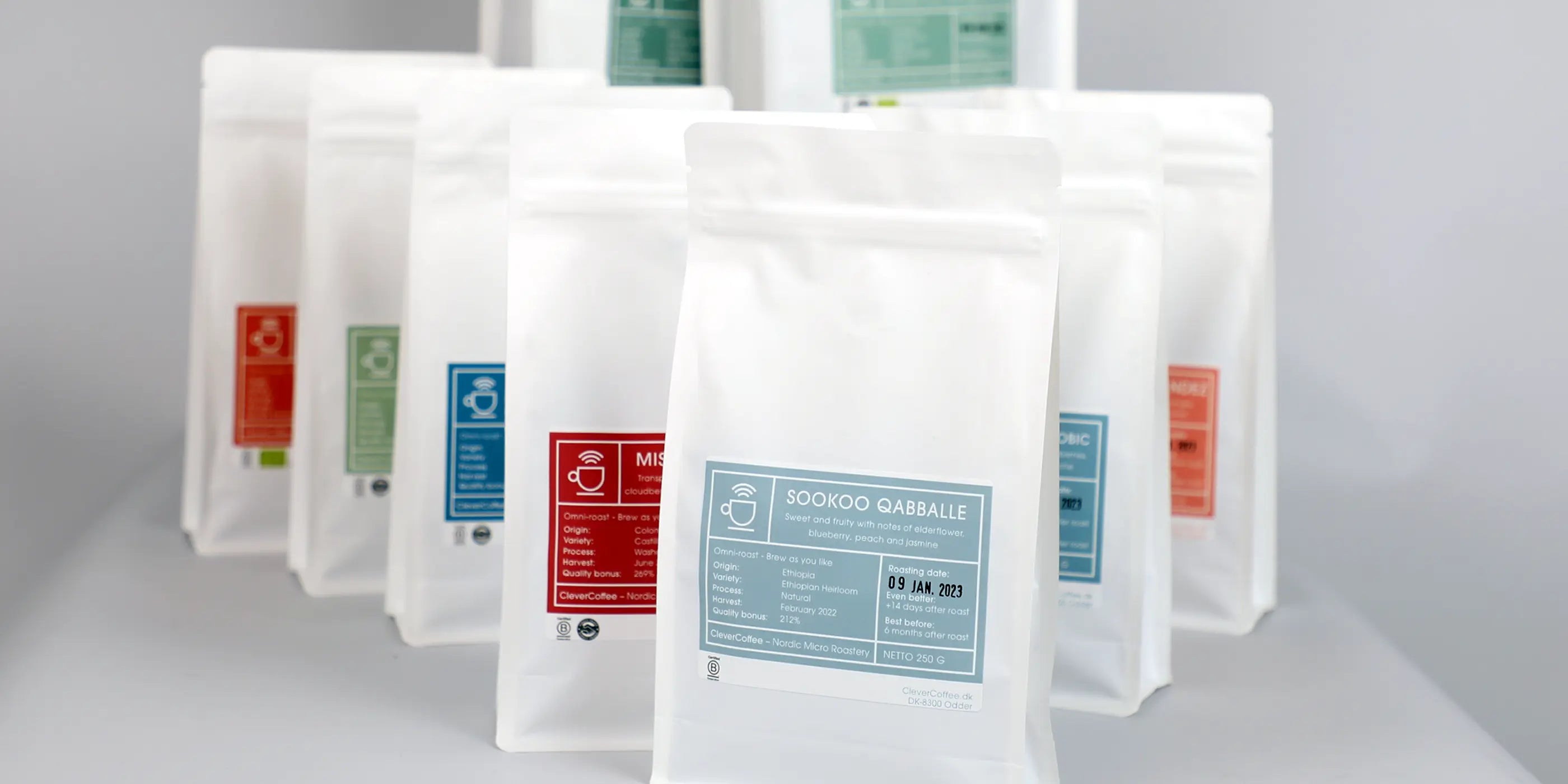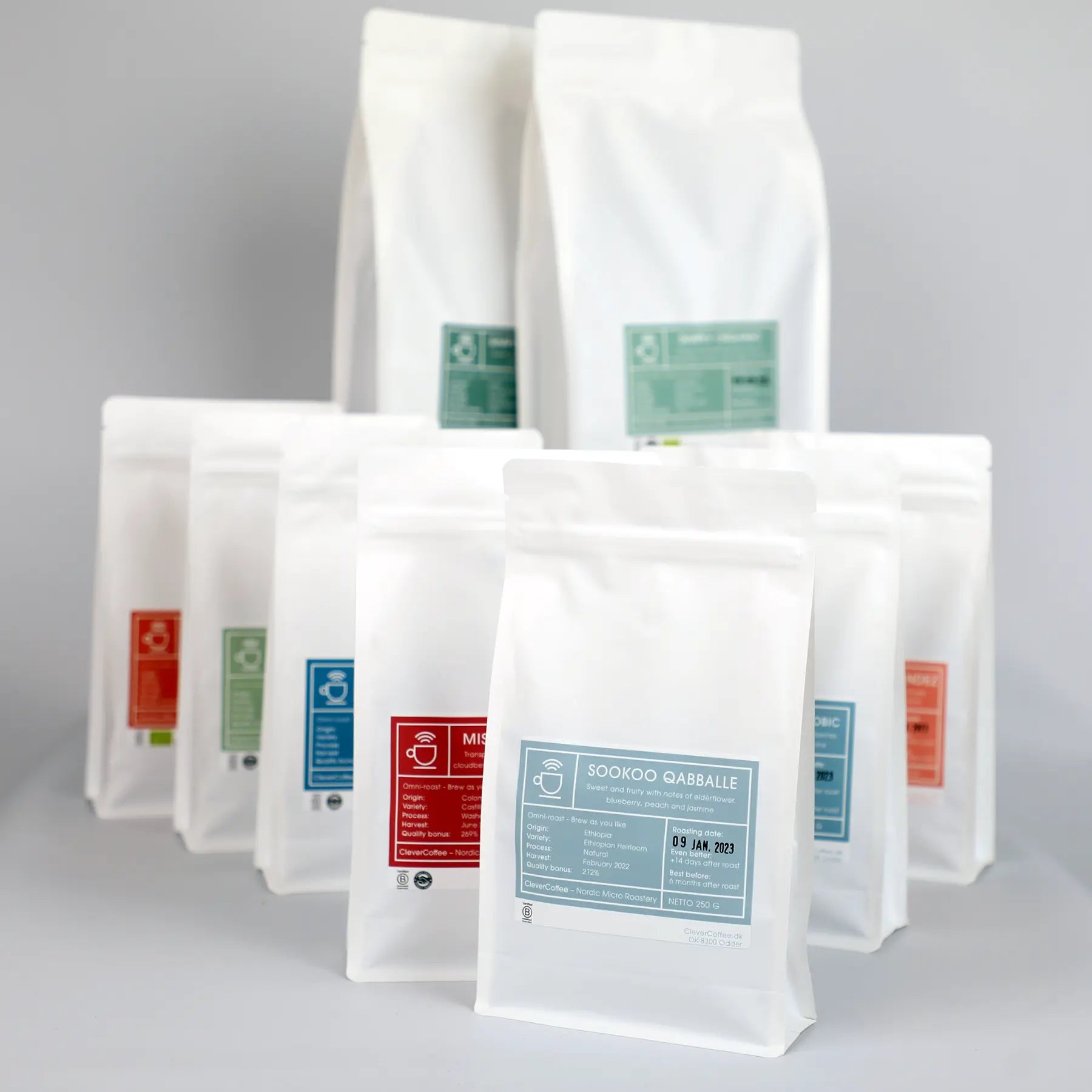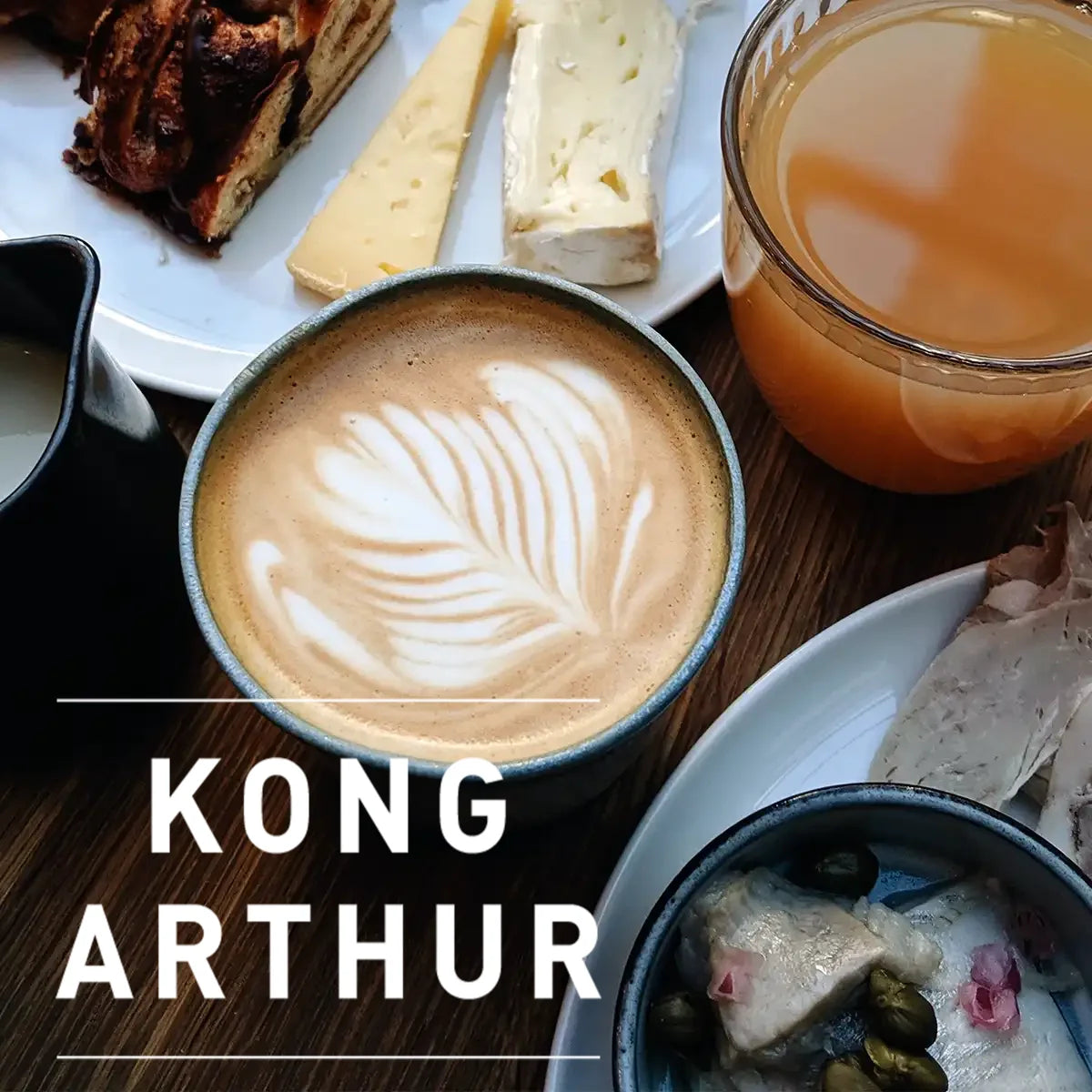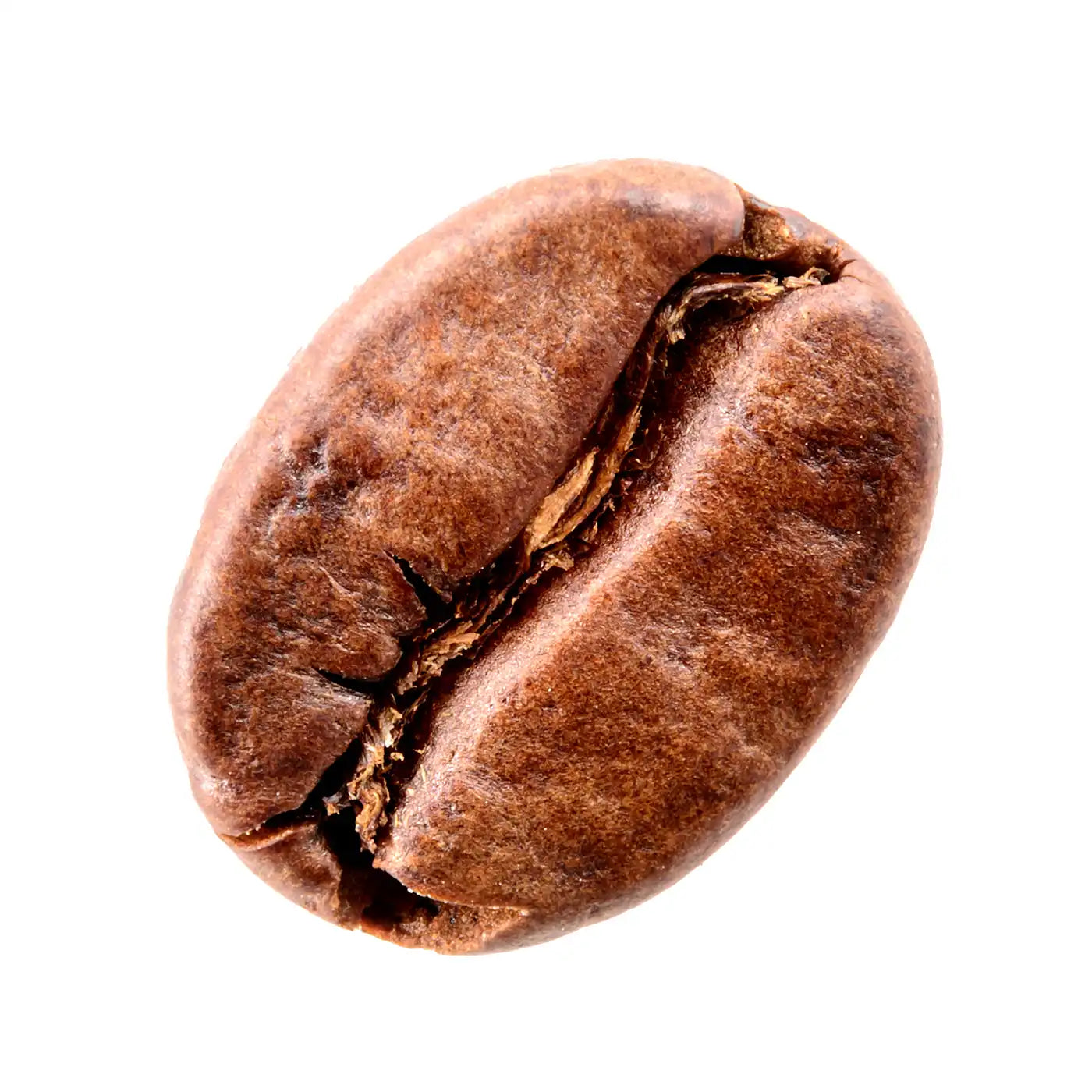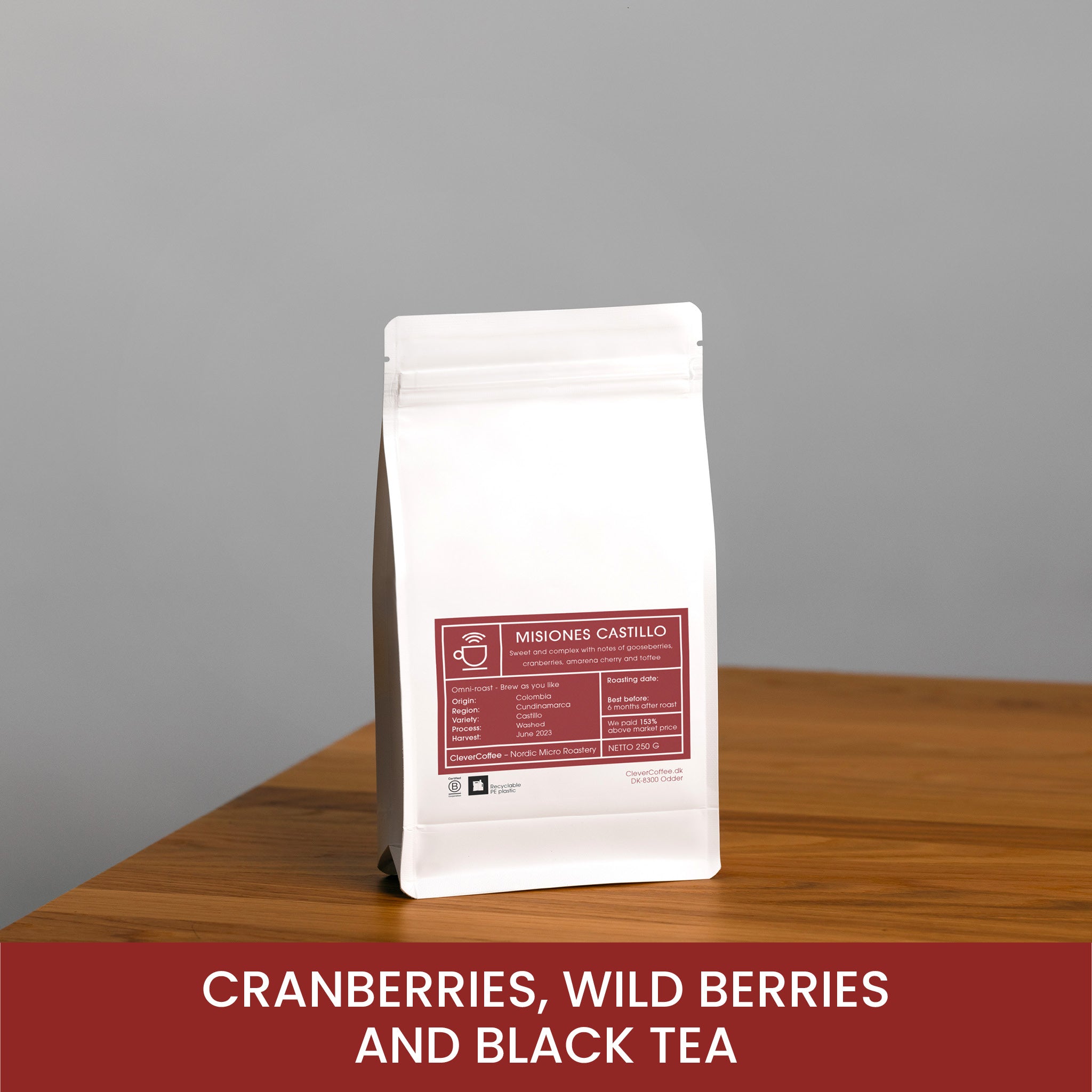
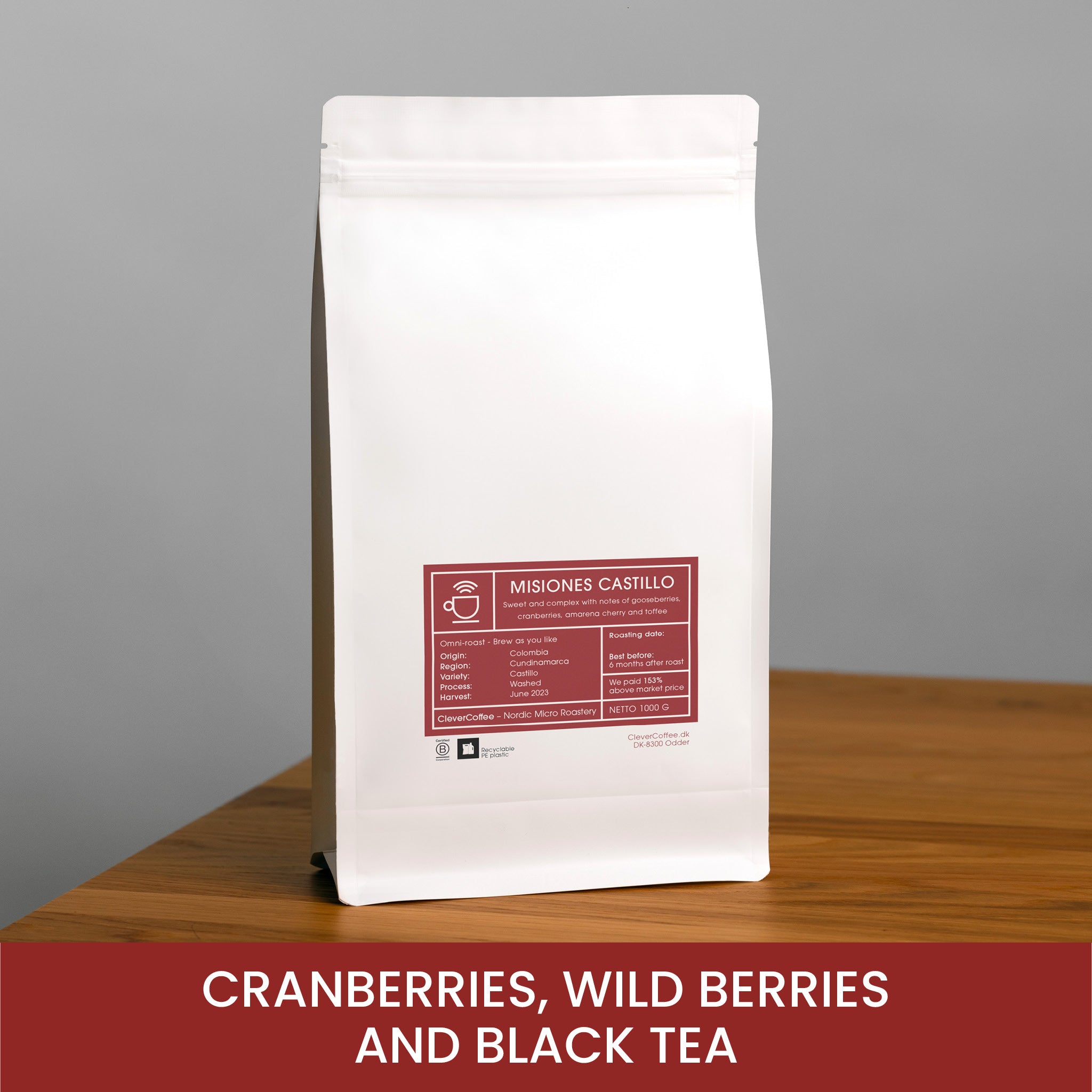
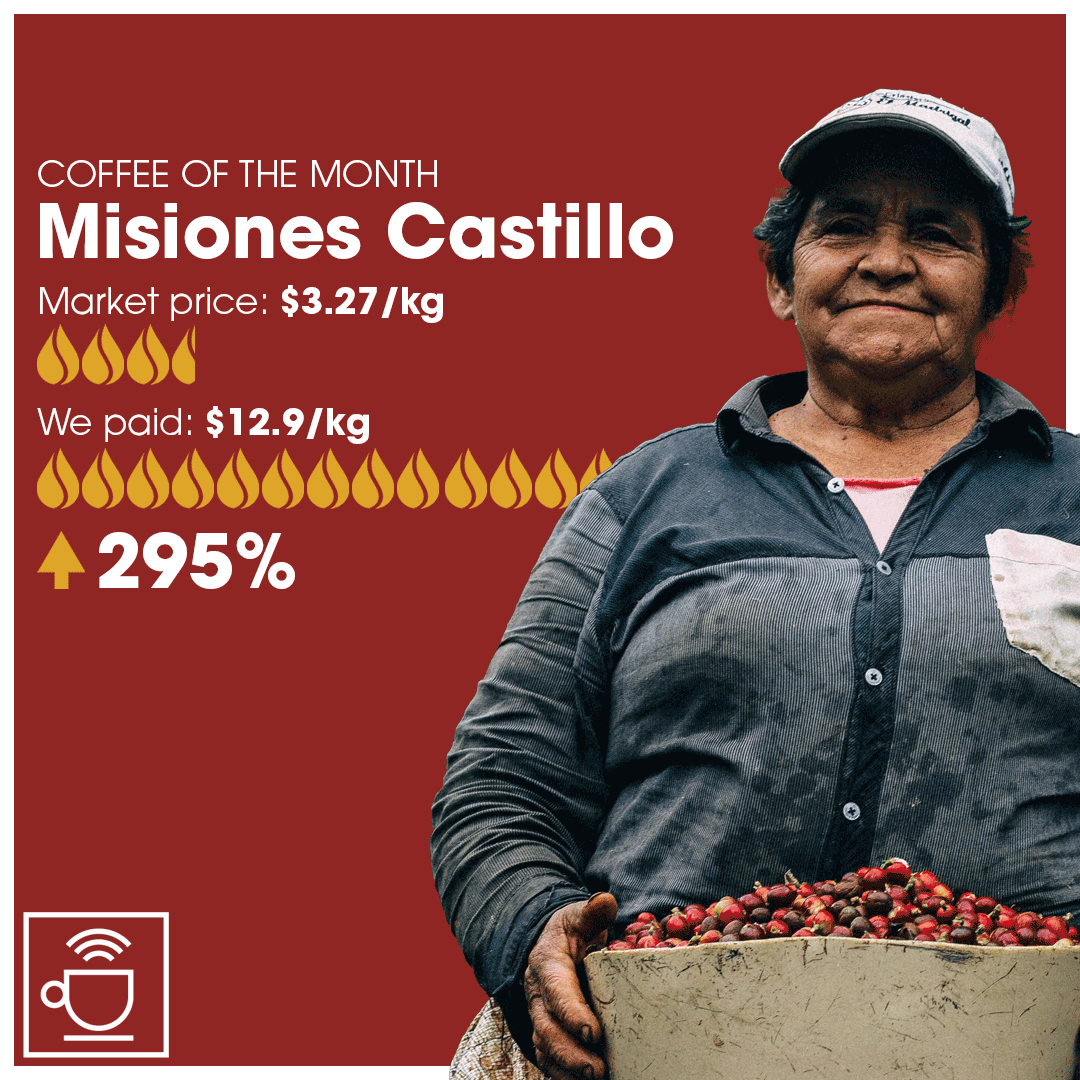
CleverCoffee
Misiones Castillo - Colombia
Ever since we met Luis Fernando and the others from Misiones at the World of Coffee in Amsterdam 2018, they have been a close and good direct trading partner. We used this coffee for the Brewers Cup in 2023, and now it is back in a new exciting harvest.
- Washed Castillo from Colombia
- Notes of gooseberry, cranberry, cherry and toffee
- Competition coffee: Brewer's Cup 2023
Omni-roasted coffee beans - brew any way you like
CleverCoffee is a certified B Corp.
The coffee you buy at CleverCoffee leaves a well-documented, positive impact on the world.
In our opinion, B Corp certification is the world's most stringent third-party verification, guaranteeing that you are buying your coffee from a responsible company.
When we were certified in 2021, we were only company number 30 in Denmark. Today there are more than 100.
The B Corp certification verifies our work in:
- Environment
- Social (Workers/Community/Customers)
- Governance
We thus have extensive documentation that we use our primary business to create a positive impact on the world.
As a customer at CleverCoffee, you contribute to ensuring that coffee farmers can live a life above the poverty line and that they can afford to develop their farms so that they have a long-term source of income.
In addition to contributing positively to the living conditions of coffee farmers, CleverCoffee's B Corp certification is your assurance that we always source our coffee responsibly and with the environment in mind.
What was our score?
When we were certified back in 2021, we received the following score:
- Governance 15.7
- Workers 20.0
- Community 27.2
- Environment 25.2
- Customers 0.0
Total: 88.2
We have begun the recertification process in 2024. Due to new initiatives and progress, we expect a significant increase in points for our new certification.
Documentation
Vi betalte kaffebonden 295% mere for denne kaffe
... til sammenligning har Fairtrade-certificeret kaffe typisk en merbetaling på mindre end 10% for bonden. Og certificeringen er heller ikke gratis.
Forskning viser gang på gang, at certificeringer som Fairtrade og Rainforest Alliance ikke har nogen beviselig positiv effekt på kaffebøndernes levevilkår. (Cordes og Sagan, 2021)
Vestlige kaffefirmaer tjener store summer, mens kaffebønder verden over lever i fattigdom. Det er forkert, og det skal vi ændre på.
Derfor betaler vi mere for de kaffebønner, vi importerer.
44% af kaffebønderne verden over lever fortsat i fattigdom. Mindst 5,5 millioner kaffebønder lever under den internationale fattigdomsgrænse på $3,20 om dagen. Undersøgelser viser, at en tredjedel af kaffebønderne tjener mindre end $100 årligt fra kaffeproduktion (Enveritas, 2018; Sachs et al., 2019).
Når vi betaler landmændene mere, giver vi dem mulighed for at investere i sig selv og deres virksomheder. Dette fører til yderligere vækst og muligheden for at investere i mere bæredygtige landbrugspraksisser som reduktion af vandforbrug og genskovningsprojekter.
Beregningen:
Vi har betalt $12.9/kg for denne kaffe (FOB).
Markedsprisen på tidspunktet for kontraktet var $3.27/kg.
Det betyder, at vi i dette tilfælde har betalt 295% over markedprisen.
Dokumentation
Se den samlede oversigt over de betalinger vi har lavet for vores kaffebønner i vores årlige transparency report: CleverCoffee: Transparency Report
Kilder
"Responsible Coffee Sourcing: Towards a Living Income for Producers" (Cordes og Sagan, 2021)
"Why do coffee farmers stay poor? : Breaking vicious circles with direct payments from profit sharing" (Ruben, 2023)
"Six Transformations to Achieve the Sustainable Development Goals (SDGs)" (Sachs et al., 2019)
En kort og gennemskuelig forsyningskæde
Vi arbejder altid med så kort og gennemskuelig en forsyningskæde, som muligt. 98% af vores kaffe er handlet direkte hos kaffefarmen, altså uden at bruge en mellemmand.
Denne kaffe er en undtagelse, da vi har brugt en transparent importør til at få kaffen hjem.
Langt størtedelen af vores ristede kaffe bliver også købt direkte hos os - med nogle enkelte forhandlere som undtagelse, såsom kaffebarer og specialtetsforretninger. Man kan ikke købe vores kaffe i nogen store kæder eller på online markedspladser.
Dermed er der færre parter der skal “have en bid af kagen” og vi sikrer en bedre betaling for kaffefarmene, som i årtier har været underbetalt og levet i fattigdom.
Forsyningskæde for denne kaffe ser sådan ud:
- Kaffen er dyrket i Colombia i området Cundinamarca
- Kaffebærene er blevet processeret på Café Misiones egen vaskestation
- Herefter er de grønne bønner blevet fragtet til CleverCoffee
- Kaffen er ristet og pakket hos CleverCoffee i vores eget risteri udenfor Aarhus
This coffee is grown in agroforestry
This roughly means that the coffee plants are shaded by other trees and plants. Agroforestry is the opposite of what is called “monoculture”, where you have a field that only consists of one type of plant, for example coffee plants.
In a forest farm, the coffee plants are part of a system with animals and plants that live naturally in the area.
There are many different types of agroforestry. There can be different amounts of shade cover, different degrees of diversity in plants and animals, and one can, for example, talk about having several different layers of shade cover, with trees that have their crowns at different heights and thus several layers.
Why agroforestry?
Since 1990, an estimated 420 million hectares of forest have been cleared and converted to agriculture, including coffee plantations. Although the rate of deforestation has slowed in recent decades, significant deforestation continues. About 10 million hectares of forest are cleared each year - an area the size of Iceland.
Therefore, we need to do something.
Forestry is a really good solution for both having food production and at the same time taking care of our ecosystems and climate.
Here are just some of the benefits of agroforestry:
- Increases biodiversity
- Absorbs much more CO2 from the atmosphere
- Minimizes the need for fertilizer
- Make coffee plants more resilient
- Extends the life of the coffee plant
- Gives the coffee a higher quality and better taste, as the coffee cherries take longer to ripen in the shade
- Better soil conditions
- Creates a microclimate that makes plants more resistant to climate change
Read more:
Direct Trade – No Middleman
We know our coffee farmers personally because we trade directly with them. This gives us a highly transparent value chain without unnecessary intermediaries.
It provides you with added assurance and brings you closer to the farm.
Direct trade means, among other things:
- More transparency
- More traceability
- Better payment to the coffee farmer
The vast majority of our coffee is purchased directly from the farmers. In 2024, 98% of our coffee was sourced through direct trade.
By cutting out the middleman, we know exactly where the money goes, ensuring that as much as possible ends up with the farmer — who has been underpaid for more than 40 years.
Direct trade allows us to better ensure quality and accountability at the source. At the same time, farmers gain access to valuable insights about the European market, new EU regulations, and more, through our partnership.
With direct trade, we achieve a much higher degree of transparency and traceability — something that’s crucial when it comes to documenting farming methods, working conditions, and whether a particular coffee has contributed to deforestation.
Taste the World
Coffee on Subscription
Get a new freshly roasted coffee delivered to your door every single month and get access to exclusive releases.

